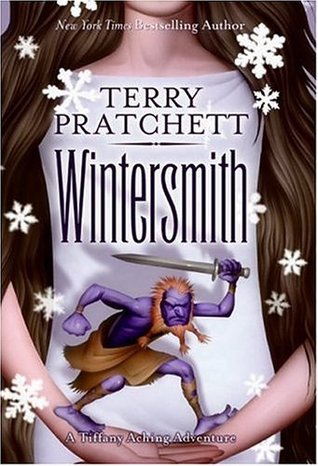Wintersmith, by Terry Pratchett
Oct 1
2006

Terry Pratchett’s third Tiffany Aching book, Wintersmith, has problems. It’s not as uproariously funny as the previous two installments, and both the main plot and the villain are emotionally underwhelming. The book’s dreamlike atmosphere works in a few places, but Pratchett’s constant shifting from humor to pathos to action makes the story’s climax fall a little flat.
Not that I cared. Everybody is in this book! Tiffany, her fellow witches-in-training, Miss Tick, Granny Weatherwax, Roland, and, of course, the Nac Mac Feegles… Pratchett has created a world full of hilariously memorable characters, and I was so pleased to see them again that any nitpicks I had barely registered.
As teen heroines go, Tiffany stands alone. She’s responsible, she’s thoughtful, and she keeps her eyes open and her mouth shut. She’s the kid we all wish we’d been—no saint, but when she makes mistakes, she does her best to fix them. She’s frequently compared to Hermione Granger, but while Hermione (at the ripe old age of eleven) was still crying in bathrooms and being attacked by trolls, Tiffany had been holding her own against far nastier beasties for years. The other major characters, the Nac Mac Feegles, are a group of six-inch-high warriors with Scottish accents, belligerent tempers, and a boundless thirst for Tiffany’s grandmother’s Special Sheep Liniment. They’re a one-note joke that, miraculously, never gets old.
The main storyline of Wintersmith is creative but poorly executed: through a slight misunderstanding, the Wintersmith, the spirit of winter, suddenly believes that Tiffany is his one true love. At first, he simply tries to court her with ice roses and snowflakes in her image, but pretty soon he’s upping the stalker factor in a variety of disturbing ways. The Wintersmith had the potential to be a great freak-out character, but Pratchett can’t seem to stop himself from making him alternately funny and pathetic. (It’s hard to get too worked up about a villain that we’ve seen get seriously excited over sausages, no matter how creepy he seems in the final scene.) But while the primary plot didn’t do much for me, I thought the secondary storyline was great: Tiffany gets caught up in a power struggle between two witches, and it takes a lot of work, thought, and fast-talking to fix matters. That might not sound as exciting as the lovesick-god stuff, but it’s a joy to watch Tiffany doing what she’s best at—straightening things out—and it gives readers a chance to catch up on almost all of the minor characters.
Nobody should start this series with Wintersmith. Even if the book made sense (and there are the usual references in the early chapters to Tiffany’s past adventures, to allow first-time readers a chance to figure out what's going on), the main storyline isn’t particularly compelling and most of the book’s charm comes from the way that it builds upon pre-established characters. This is a delightful chapter in a wonderful ongoing series, but it doesn’t work nearly as well as a standalone novel.
Not that I cared. Everybody is in this book! Tiffany, her fellow witches-in-training, Miss Tick, Granny Weatherwax, Roland, and, of course, the Nac Mac Feegles… Pratchett has created a world full of hilariously memorable characters, and I was so pleased to see them again that any nitpicks I had barely registered.
As teen heroines go, Tiffany stands alone. She’s responsible, she’s thoughtful, and she keeps her eyes open and her mouth shut. She’s the kid we all wish we’d been—no saint, but when she makes mistakes, she does her best to fix them. She’s frequently compared to Hermione Granger, but while Hermione (at the ripe old age of eleven) was still crying in bathrooms and being attacked by trolls, Tiffany had been holding her own against far nastier beasties for years. The other major characters, the Nac Mac Feegles, are a group of six-inch-high warriors with Scottish accents, belligerent tempers, and a boundless thirst for Tiffany’s grandmother’s Special Sheep Liniment. They’re a one-note joke that, miraculously, never gets old.
The main storyline of Wintersmith is creative but poorly executed: through a slight misunderstanding, the Wintersmith, the spirit of winter, suddenly believes that Tiffany is his one true love. At first, he simply tries to court her with ice roses and snowflakes in her image, but pretty soon he’s upping the stalker factor in a variety of disturbing ways. The Wintersmith had the potential to be a great freak-out character, but Pratchett can’t seem to stop himself from making him alternately funny and pathetic. (It’s hard to get too worked up about a villain that we’ve seen get seriously excited over sausages, no matter how creepy he seems in the final scene.) But while the primary plot didn’t do much for me, I thought the secondary storyline was great: Tiffany gets caught up in a power struggle between two witches, and it takes a lot of work, thought, and fast-talking to fix matters. That might not sound as exciting as the lovesick-god stuff, but it’s a joy to watch Tiffany doing what she’s best at—straightening things out—and it gives readers a chance to catch up on almost all of the minor characters.
Nobody should start this series with Wintersmith. Even if the book made sense (and there are the usual references in the early chapters to Tiffany’s past adventures, to allow first-time readers a chance to figure out what's going on), the main storyline isn’t particularly compelling and most of the book’s charm comes from the way that it builds upon pre-established characters. This is a delightful chapter in a wonderful ongoing series, but it doesn’t work nearly as well as a standalone novel.
Posted by: Julia, Last edit by: Julianka
No new comments are allowed on this post.
Comments
lori
I actually enjoyed this book far more than I did A Hat Full of Sky. It was funny, touching in places, and in true Terry Pratchett style - smart. I love this series!